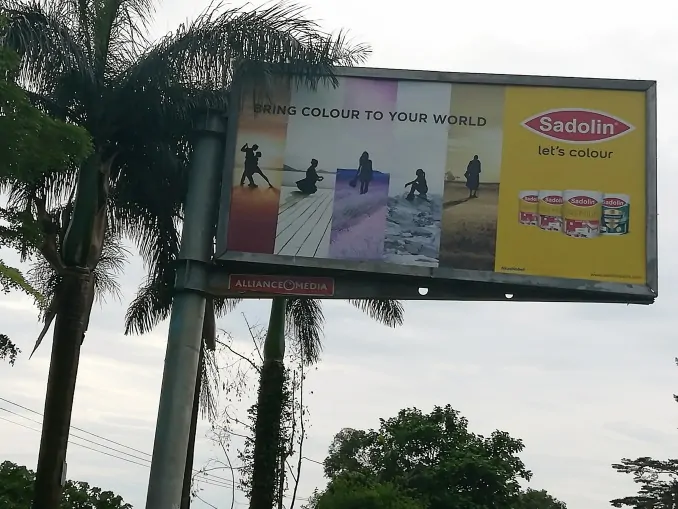On Saturday, Police arrested a Kansai Plascon sales executive for what the spokesperson of the Criminal Intelligence and Investigations Directorate, Vicent Ssekate, said was offensive digital communications in relation to Sadolin Paint.
The arrest marks a new front in the battle between the two paint companies. Kansai Plascon Africa Limited, the South-Africa based subsidiary of Japanese Kansai Paint Co, announced in February that it had reached a binding agreement with AkzoNobel for the full acquisition of Sadolin Paints’ operations in Uganda, Kenya, Tanzania, Zanzibar, and Burundi.
But along the way, the two parties failed to agree on how the takeover would be affected. While announcing their entry into Uganda, Kansai Plascon said that it was phasing out the Sadolin paint brand and replacing it with Plascon.
This did not go down well with AkzoNobel. “By the agreement, after acquiring Sadolin, Plascon were obliged to continue producing, selling and marketing the Sadolin Brand until the end of January next year,” the Dutch paints and coatings company said in a statement.
AkzoNobel issued a notice to the Kenya-based Sadolin Paints East Africa in February saying that the licence agreement between the two would expire in a year instead of the previous 31 December 2019 date. AkzoNobel owns the Sadolin trademark, and had partnered with the Kenyan firm to manufacture and sell Sadolin-branded paint in Eastern Africa.
When Kansai Plascon announced earlier in the year that it had fully acquired Sadolin Paint’s operations in the region, it meant it had purchased Sadolin Paints East Africa.
Sadolin Paints East Africa sued for breach of contract in Kenya, but the court ruled in favour of AkzoNobel, allowing it to keep ownership of the Sadolin brand.
As a result, AkzoNobel decided to relaunch Sadolin in East Africa – a decision announced not long after the official launch of Kansai Plascon. The Dutch paints and coatings firm says Kansai Plascon breached an agreement to keep Sadolin on the market until the end of next January, and launched a new brand – Plascon – instead.
AkzoNobel accused Kansai Plascon of “deliberate breaches of contract as evident in the over-labelling of Sadolin packs with Plascon labels,” which it says left it with no choice but to cancel the license agreement between the two.
It relaunched Sadolin on the Ugandan market last month after entering a partnership with Regal Paints, a paints company that was already established locally. Regal Paints will oversee the sales and distribution of Sadolin on behalf of AkzoNobel, even as the two companies say they are going to construct a Shs10bn manufacturing plant in Uganda.
It’s these successive announcements and developments that have bewildered the public and led to a turf war between the two global coatings heavyweights. Kansai Plascon said it was acquiring Sadolin Paints, and soon after launched a big publicity campaign saying it was changing Sadolin to Plascon. “It’s only a change of name, our paints remain the same, Uganda’s biggest paint company is now called Plascon,” it said. At the same time, Sadolin was being relaunched by a company few people had heard of; in addition, it was to be marketed by a former competitor.
For its part, AkzoNobel says Kansai Plascon’s claim that it’s only a change of name but the paints remain the same is misleading. “Sadolin has been owned by AkzoNobel since 1987 and was founded by Gunnar Sadolin in 1907,” it said in a statement. “It was never owned by the local licensee, Sadolin Paints East Africa; the licensee was purely manufacturing, selling and distributing the Sadolin brand on behalf of AkzoNobel.”
A Sadolin Paint official – the Sadolin that is part of Regal Paints – told this website that they reported Plascon sales executive to police for spreading propaganda against their paint brand. The sales executive, who was released on bond yesterday, was apparently inciting the public not to buy the relaunched Sadolin paint, calling it fake and “Regal paint in a plastic can.”
The claims were posted on WhatsApp and Facebook, including on Sadolin’s Facebook page, the official said.
Although the case was brought against an individual – Mr Ssekate said the complainant was a Regal Paints director – the Sadolin official said they have a number of cases that they intend to lodge against Plascon, although they did not elaborate on the nature of the cases.
Efforts to contact Kansai Plascon Uganda officials were unsuccessful as they did not pick our calls.
Before the entry of Kansai Plascon, Sadolin said it had a 50% market share on the Ugandan market. And although it has now moved to selling Plascon, industry sources told this website that it has retained the bulk of Sadolin’s market share.
The onus is on the relaunched Sadolin to regain the share it lost. The Plascon sales executive had good reason for claiming that the new Sadolin is Regal paint in a plastic can: the prevailing narrative in the paints market is that Sadolin was a superior product to Regal paint. By saying that they – Plascon – have the “real” Sadolin and that the new Sadolin is repackaged Regal paint, he’s sowing doubt about the quality of the relaunched product.
AkzoNobel and Kansai are both global paints and coatings majors. In their quest for dominance in Uganda, the paints market is in for a long and interesting fight.







